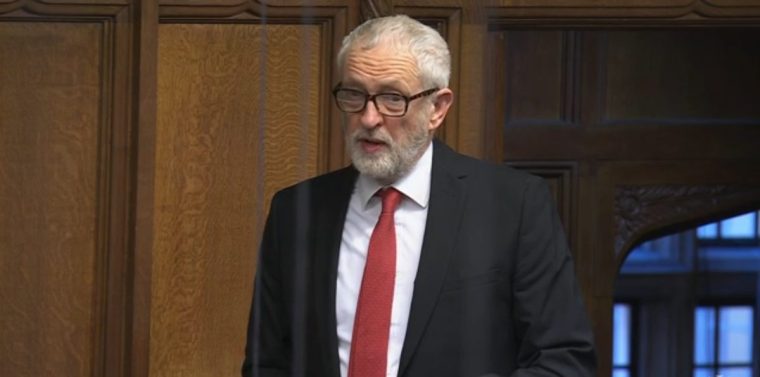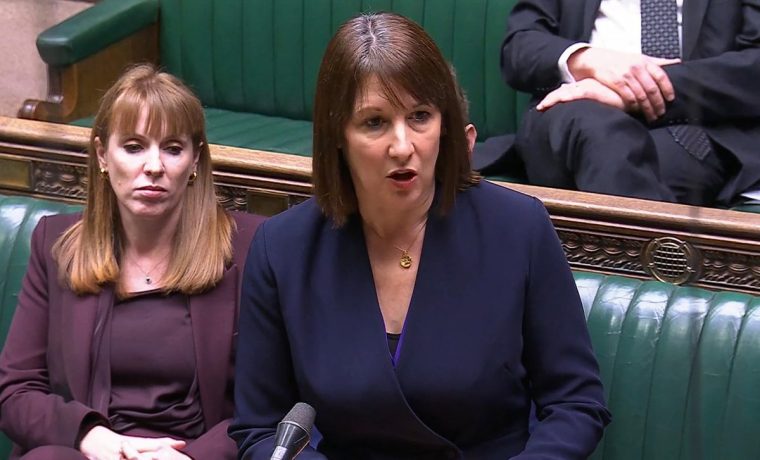The Prime Minister has told Tulip Siddiq the “door remains open” after she resigned from her role as a City and anti-corruption minister.
Rachel Reeves refused to rule out an emergency March Budget when asked in the House of Commons today, instead reiterating commitment to her self-imposed fiscal rules.
It comes after The i Paper reported that the measure was on the cards last week.
Meanwhile, Reform UK is now just one percentage point behind Labour, with Nigel Farage’s party pushing the Tories into third place, a new poll of voters shows.
Follow the latest updates with The i Paper live blog.
MPs debate rental reforms
New legislation will modernise how the country’s “insecure and unjust private rented sector” is regulated, the Government has pledged, as rental reforms are again debated in Parliament.
Labour MP Paula Barker said the Government should “look to go further” on protections for renters by introducing rent stabilisation.
The Liverpool Wavertree MP said: “It’s all well and good the Government saying they do not support rent stabilisation, but as a country we have to come back to this issue, maybe not tomorrow or next month, but inevitably at some point we will.
“Because the private rented sector is a housing market that has lost all sense of proportion, and on this nothing will change. The problem of affordability will continue to get worse.”
Ms Barker added: “The very reason we have this Bill in the first place is because as a society we have lost faith in the landlord class to regulate themselves, yet we continue to trust them on the rent they charge.
“To break free of handing a gargantuan proportion of their income to fund the passive income of the landlord class, the death of a grandparent, or an early advance of their inheritance, might help them out if they’re so lucky.”
Badenoch attacks Starmer ‘dithering’ and ‘weak leadership’ over Siddiq
Reacting to Tulip Siddiq’s resignation, Kemi Badench insists it was clear at the weekend that the anti-corruption minister’s position was “completely untenable”.
In a post on social media, the Tory leader said: “Yet Keir Starmer dithered and delayed to protect his close friend.
“Even now, as Bangladesh files a criminal case against Tulip Siddiq, he expresses ‘sadness’ at her inevitable resignation.
“Weak leadership from a weak Prime Minister.”
Siddiq thanks Starmer for ‘confidence’ he showed in her
In her resignation letter to the Prime Minister, Treasury minister Tulip Siddiq thanked Sir Keir Starmer for the “confidence” he has shown her.
She said: “Having conducted an in-depth review of the matter at my request, Sir Laurie has confirmed that I have not breached the Ministerial Code.

“As he notes, there is no evidence to suggest that I have acted improperly in relation to the properties I have owned or lived in.
“My family connections are a matter of public record, and when I became a minister I provided the full details of my relationships and private interests to the Government.
“However it is clear that continuing in my role as Economic Secretary to the Treasury is likely to be a distraction from the work of Government.
“My loyalty is and always will be to this Labour Government and the programme of national renewal and transformation it has embarked upon. I have therefore decided to resign from my ministerial position.”
Starmer insists ‘door remains open’ for Siddiq to return
Sir Keir Starmer said the “door remains open” for Tulip Siddiq in his letter accepting her resignation as Treasury minister.
The Prime Minister said: “Thank you for your letter. It is with sadness I accept your resignation from your ministerial role.
“I want to thank you for your commitment during your time as Economic Secretary to the Treasury including spearheading the rollout of banking hubs and opening our 100th site, leading our thinking on financial inclusion, and contributing to the success of the Chancellor’s first Mansion House speech.
“In accepting your resignation, I also wish to be clear that Sir Laurie Magnus as independent adviser has assured me he found no breach of the Ministerial Code and no evidence of financial improprieties on your part. I want to thank you for self-referring to the independent adviser and for your full co-operation with the establishment of facts.
“I appreciate that to end ongoing distraction from delivering our agenda to change Britain, you have made a difficult decision and want to be clear that the door remains open for you going forward.”
The Tulip Siddiq saga shows just how naïve Labour is
Earlier this month, columnist Anne McElvoy wrote that Tulip Siddiq’s position was untenable.
She wrote: “When it comes to politics and global wealth, the biggest accidents happen in the blind spot – and here is another example that when it comes to money and mates, Labour has a glaring one.”
Read the full story here
Siddiq quits and says she doesn’t want to be a ‘distraction’
In a resignation letter to the Prime Minister Sir Keir Starmer, Tulip Siddiq has said she no longer wanted to be a “distraction” to the Government.
She wrote: “I am grateful to your independent advisor on ministerial standards, Sir Laurie Magnus, for the speed and thoroughness in response to my self-referral, and for giving me the opportunity to share the full details of my finances and living arrangements both present and historic.”
Ms Siddiq has denied all allegations against her and was not found in breach of the ministerial code.
But she has faced mounting pressure over claims she benefited financially from three London properties linked to her aunt, the former Prime Minister of Bangladesh.
In a post on social media, she said: “An independent review has confirmed that I have not breached the Ministerial Code and there is no evidence to suggest I have acted improperly.
“Nonetheless, to avoid distraction for the Government, I have resigned as City Minister.”
Siddiq leaves Government amid ethics probe
Treasury and anti-corruption minister Tulip Siddiq has left the Government, No 10 has said.
Siddiq, the Economic Secretary to the Treasury who is responsible for the UK’s anti-corruption efforts, is facing allegations that she was involved in a Bangladeshi nuclear deal that misappropriated billions in government funds.
It has also been claimed that she benefited from a number of London properties owned by allies of her aunt, the deposed former Bangladeshi Prime Minister Sheikh Hasina.
High street lender hikes mortgages after market chaos
A high street lender has hiked mortgage rates as ongoing market turmoil sent Government borrowing costs soaring.
Virgin Money increased the price of two and five-year deals by as much as 0.2 percentage points on Wednesday, causing concern for homeowners.

The bank’s 65 per cent and 75 per cent loan-to-value (LTV) purchase rates spiked by 0.2 per cent , while 85 per cent LTV five-year fixes were increased by 0.1 per cent .
Recent turmoil in UK government bond markets, caused by worries over UK public sector debt levels and stalling growth, is also seen as adding to pressure on mortgage rates.
The bond market chaos follows Rachel Reeves’ Budget which saw taxes hiked, with the Chancellor today refusing to rule out spending cuts in response to market moves.
Speaking in the Commons, Ms Reeves repeatedly said she would stick to her own self-imposed fiscal rules.
Blunkett wants ministers to take action on foreign funding
Labour grandee David Blunkett is set to call for ministers to act to stop wealthy foreigners such as Elon Musk from pumping money in to British politics.
The former Home Secretary has tabled a question in the House of Lords, to be answered by a minister on Wednesday, asking what steps are being taken to tighten up existing rules.

The question asks “what steps they are taking to prevent political parties, and activities to promote political parties, from receiving funding from outside of the United Kingdom, and whether they plan to grant additional powers to the Electoral Commission in this regard”.
The issue has taken on new sensitivity following rumours that Musk, the boss of Tesla and X, was preparing to donate as much as £100m to Reform UK.
While foreign individuals cannot personally donate to British political parties or candidates, the current rules can allow them to give money if they own a UK-registered company.
Blunkett is expected to warn that ministers must make the rules stricter “before it’s too late” to stop rich foreigners or even overseas states from interfering in Britain’s democracy.
The Government has previously indicated that it is not planning to change the current rules, amid warnings that doing so in response to Musk’s behaviour could appear to be an attempt to cut off funding to a rival political party.
The extent of the South African entrepreneur’s future ties to Reform is in question after he tweeted that Nigel Farage should quit as party leader.
Musk has sent hundreds of messages about British politics in recent weeks, calling for Sir Keir Starmer to be prosecuted over the grooming gangs scandal and expressing support for far-right agitator Tommy Robinson.
Meeting on Wednesday set to seal Chagos Islands deal
A deal on the Chagos Islands is poised to be sealed between the UK and Mauritius this week, it has been claimed.
Ministers have been urged to delay decisions on abandoning control of the British Overseas Territory until after Donald Trump’s inauguration.

The UK struck a deal to cede sovereignty over the Chagos Islands – but lease back the strategically important UK-US military base on Diego Garcia for at least 99 years.
Sources close to the Mauritian government told The Telegraph both sides have reached a consensus on a pact after talks in London, however, a UK source pushed back against the claim.
But the Mauritius government has set a special cabinet meeting tomorrow morning which is set to sign off the Chagos deal.
Conservative MPs have urged caution from the Government and suggested ministers hold off for at least week given hostility to the proposed arrangement from Mr Trump’s allies.
The exchanges in the House of Commons came as preparations for Mr Trump’s presidency were discussed at Cabinet on Tuesday.
The UK struck a deal to cede sovereignty over the Chagos Islands – but lease back the strategically important UK-US military base on Diego Garcia for at least 99 years.
The proposed agreement, which includes the UK paying an annual sum of money, was struck before elections in both Mauritius and the United States and has run into trouble since the results of those contests.
Corbyn warns landlords are using ‘unreasonable arguments to terminate tenancies’
Former Labour leader Jeremy Corbyn, now the independent MP for Islington North in London, intervened in a speech by housing minister Matthew Pennycook and asked: “Is he aware that there seems to be quite a lot of landlords at the present time who are using unreasonable arguments in order to terminate tenancies or raise rents ahead of this legislation coming in?
“Is there anything that he or his department can do to protect tenants during this quite stressful period for them?”
Mr Pennycook told the Commons: “There is a lot of bad practice out there. That’s the very reason why the Government have acted so quickly to ensure these reforms are introduced and we’re confident these reforms once in place will provide tenants with the protection they deserve.
“In the interim, I’m afraid there will continue to be bad practice of the kind this Bill will stamp out.”
The minister had earlier said: “Our Renters’ Rights Bill will modernise the regulation of our country’s insecure and unjust private rented sector, levelling decisively the playing field between landlord and tenant.
“It will empower renters by providing them with greater security, rights and protections so they can stay in their homes for longer, build lives in their communities and avoid the risk of homelessness. It will ensure we can drive up the quality of privately rented housing, so that renters have access to good quality and safe homes as a matter of course.”

The era of the small landlord is over and it might change housing for the better – Analysis
Labour’s Renters’ Rights Bill moves a step closer to law today as it appears in the Commons for the third and final time. From here, it will go to the Lords.
The bill is the biggest shakeup of private renting since Margaret Thatcher’s 1988 Housing Act deregulated the sector, removing rent controls and reassuring mortgage lenders that landlords could quickly and easily turf out tenants via Section 21 “no fault” evictions.
These changes, combined with the introduction of mainstream buy-to-let mortgages in the 90s, caused a private landlord boom that has reshaped Britain’s housing market.
As it became harder for first-time buyers to obtain mortgages following the financial crisis, the easy flow of buy-to-let lending coupled with fewer restrictions on landlords, saw the number of households living in privately rented homes rise from 2.7 million in 2007 to 4.5 million by 2017.
Today, more people are living in privately rented homes than in social housing.
Like the earlier Tory version of this bill, Labour’s reforms will ban “no fault” evictions. Instead, landlords will have to use Section 8 evictions which are only allowed when a tenant is in significant rent arrears or has been reported for serious anti-social behaviour.

Under the stewardship of Deputy Prime Minister Angela Rayner and Housing Minister Matthew Pennycook, the Renters’ Rights Bill will also cap the amount of rent upfront that landlords can ask for at one month, as The i Paper reported exclusively last week.
Labour will also introduce soft regulation of private rents by giving tenants new powers to challenge “unreasonable” rent increases.
Once law, the Renters’ Rights Bill will mean that landlords will be able to increase rents once a year to the market rate – the price that would be achieved if the property was newly advertised to let. To do this, they will need to serve a simple “section 13” notice, setting out the new rent and giving at least two months’ notice of it taking effect.
MPs are now debating the Renters’ Rights Bill
A Commons vote on the remaining stages of the Renters’ Rights bill is expected at 7pm tonight, with MPs expected to back an amendment introduced by Labour MP Alex Sobel to stop landlords from demanding more than a month’s rent in advance, as first reported by The i Paper.
Tenants engaged in bidding wars “risk being locked out of renting”, housing minister Matthew Pennycook warned as the debate began.
Introducing changes to the Renters’ Rights Bill which would “limit the amount of rent that a landlord can require to a maximum of one month”, Mr Pennycook said they would “prevent unscrupulous landlords from using rent in advance to either set tenants against each other in de facto bidding wars, or exclude altogether certain types of renters who are otherwise perfectly able to afford the monthly rent on a property”.
The minister had earlier told the Commons: “Tenants find and view a property that as advertised matches their budget only to find that on application, they’re suddenly asked to pay several months’ rent up front to secure it. Tenants in such circumstances almost always confront an impossible choice.
“Do they find a way to make a large rent in advance payment, thereby potentially stretching their finances to breaking point? Or do they walk away and potentially risk homelessness if they are unable to find an alternative?”
Mr Pennycook said tenants are “encouraged to offer ever larger sums up front to outdo the competition and secure a home that may or may not be of a good standard, or risk being locked out of renting altogether”.
Chancellor does not rule out emergency March Budget
Tory MP Nick Timothy asked the Chancellor: “Can she rule out any new tax rises or departmental spending cuts in the March Statement, or will the fiscal forecast become an emergency budget?”
But Reeves stopped short of ruling it out completely.
She replied: “We have committed to having just one budget per year to provide businesses with the certainty that they need to invest, so we will have an update from the OBR in March.
“We have set out the fiscal rules that we will balance day-to-day spending with tax receipts and we will get debt down as a share of GDP within the forecast period, and we will continue at all times to meet those fiscal rules.”
Reeves says she raised human rights on China trip
Rachel Reeves raised human rights and the case of detained British national and pro-democracy activist Jimmy Lai on her visit to China, she has said.
Liberal Democrat Treasury spokeswoman Daisy Cooper, the MP for St Albans in Hertfordshire, said: “The Chancellor should not have gone to China unless there was a commitment that Jimmy Lai was going to be released.”
Reeves told the Commons: “I’m not sure how the honourable lady thinks we’re going to raise difficult issues unless we engage with the second-biggest economy in the world.
“And because I went to China, I was able to raise issues around human rights, around forced labour, around Hong Kong and Jimmy Lai, and around the sanctioning of parliamentarians. You can’t raise those issues unless you are in the room.”

Chancellor dodges question on spending cuts
The Chancellor said she won’t write “five years of budgets” when asked if she will rule out future spending cuts.
SNP Westminster leader Stephen Flynn said: “Will the Chancellor of the Exchequer do what the Prime Minister refused to do yesterday and rule out future spending cuts?”
Rachel Reeves replied: “I’m not going to write five years worth of budgets in the first six months of a Labour Government.
“But I’m absolutely committed to meeting the fiscal rules that I set out in the budget in October, because we know what happens when Governments lose control of the public finances, and that is they crash the economy, and end up on that side of the House.”
Labour rallies around Reeves
Labour MPs are rallying around Reeves in this statement – many on the Government benches and very supportive so far.
Reeves blames ‘global volatility’ for economic turmoil
Rachel Reeves has blamed “global volatility” in markets for recent turmoil hitting Government borrowing.
Responding to a question from the opposition benches, she asked if it was “reasonable to suggest the reason why bond yields in the United States, in Germany and France have risen is because of decisions made by this Government”.
Iain Duncan Smith warns against slave labour China imports
Conservative former leader Sir Iain Duncan Smith asked if the Government will allow import of goods “that contain any slave labour” from China.
Sir Iain, who is one of a number of MPs sanctioned by China, told the Commons: “The reality I want to put to [Chancellor Rachel Reeves] is that while she was away, [clothing company] Shein refused, point blank, in a select committee to answer the question whether they had slave labour in their supply chains, but the Government wants them to register here in London.”
He added: “So can I ask the Chancellor to be clear now to the House about the Government’s position on slave labour?”
Reeves blames ‘global volatility’ for economic turmoil
Rachel Reeves has blamed “global volatility” in markets for recent economic turmoil hitting Government spending.
Responding to a question from the opposition benches, she asked if it was “reasonable to suggest the reason why bond yields in the United States, in Germany and France have risen is because of decisions made by this Government”.



